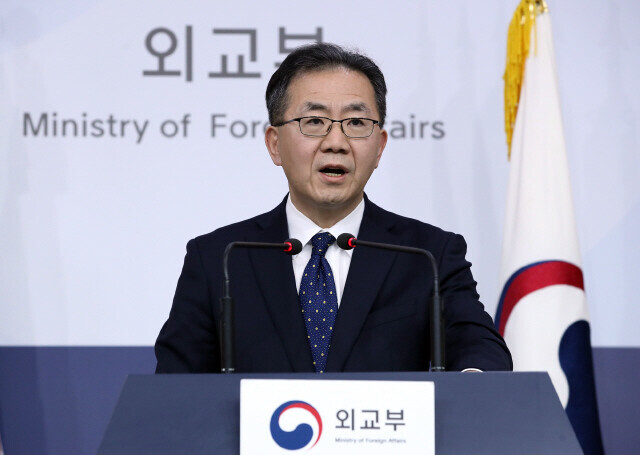hankyoreh
Links to other country sites 다른 나라 사이트 링크
GSOMIA can be terminated at any time, S. Korea’s foreign ministry spokesperson says

With the extension of South Korea and Japan’s General Security of Military Information Agreement (GSOMIA) emerging as a sensitive topic between the two sides, the South Korean government stated that the agreement “can be ended at any time regardless of the date.” Seoul seems to be applying pressure on Tokyo amid its lack of good faith signals in diplomatic discussions on a Supreme Court ruling ordering compensation for survivors of forced labor.
“The South Korean government suspended the validity of its termination announcement on Nov. 22 of last year with the understanding that the validity of the South Korea-US GSOMIA is something that can be terminated at any time,” Ministry of Foreign Affairs Spokesperson Kim In-chul said in a regular press conference on Aug. 4 with regard to the extension of GOSMIA, which is set to expire in late November.
“We remain unchanged in our position that the question of whether to exercise this right is something to be examined in response to Japan’s actions regarding the withdrawal of its export controls,” Kim continued. “GSOMIA can be ended at any time by the South Korean government, regardless of the date, and the concept of extending the agreement each year does not currently apply.”
At the time of its move on Nov. 22 of last year to reserve its GSOMIA termination decision three months earlier in late August, the Blue House said it had received “the Japanese government’s understanding” on the point that it was “capable of suspending the agreement’s validity at any time.”
With his remarks, Kim reiterated that South Korea has the right to terminate the agreement at any time it chooses, regardless of its provision stating that it is “automatically extended each year in the absence of written notification through diplomatic channels 90 days before termination [Aug. 23].”
But Kim’s reference to “Japan’s actions regarding the withdrawal of its export controls” as a basis for the decision on whether to extend GSOMIA raised questions about whether he was accurately representing Seoul’s position.
With the South Korean government having decided on June 2 to resume World Trade Organization (WTO) dispute settlement procedures regarding Japanese export controls on hydrogen fluoride and two other materials, the “policy dialogue” that had been taking place between the South Korean Ministry of Trade, Industry and Energy and the Japanese Ministry of Economy, Trade and Industry has effectively broken down.
A senior Blue House official commented only that GSOMIA would be “automatically extended if no one says anything” and that the South Korean government was “responding in good faith to the negotiations that are currently underway” for execution of the Supreme Court’s ruling.
By Gil Yun-hyung, staff reporter
Please direct comments or questions to [english@hani.co.kr]

Editorial・opinion
![[Column] Season 2 of special prosecutor probe may be coming to Korea soon [Column] Season 2 of special prosecutor probe may be coming to Korea soon](https://flexible.img.hani.co.kr/flexible/normal/500/300/imgdb/original/2024/0426/3317141030699447.jpg) [Column] Season 2 of special prosecutor probe may be coming to Korea soon
[Column] Season 2 of special prosecutor probe may be coming to Korea soon![[Column] Park Geun-hye déjà vu in Yoon Suk-yeol [Column] Park Geun-hye déjà vu in Yoon Suk-yeol](https://flexible.img.hani.co.kr/flexible/normal/500/300/imgdb/original/2024/0424/651713945113788.jpg) [Column] Park Geun-hye déjà vu in Yoon Suk-yeol
[Column] Park Geun-hye déjà vu in Yoon Suk-yeol- [Editorial] New weight of N. Korea’s nuclear threats makes dialogue all the more urgent
- [Guest essay] The real reason Korea’s new right wants to dub Rhee a founding father
- [Column] ‘Choson’: Is it time we start referring to N. Korea in its own terms?
- [Editorial] Japan’s rewriting of history with Korea has gone too far
- [Column] The president’s questionable capacity for dialogue
- [Column] Are chaebol firms just pizza pies for families to divvy up as they please?
- [Column] Has Korea, too, crossed the Rubicon on China?
- [Correspondent’s column] In Japan’s alliance with US, echoes of its past alliances with UK
Most viewed articles
- 1‘We must say no’: Seoul defense chief on Korean, USFK involvement in hypothetical Taiwan crisis
- 2Is Japan about to snatch control of Line messenger from Korea’s Naver?
- 3No good, very bad game for Korea puts it out of Olympics for first time since 1988
- 4Samsung subcontractor worker commits suicide from work stress
- 5[Editorial] Korea’s surprise Q1 growth requires objective assessment, not blind fanfare
- 6Division commander ordered troops to enter raging flood waters before Marine died, survivor says
- 7N. Korean delegation’s trip to Iran shows how Pyongyang is leveraging ties with Moscow
- 8Korea’s 1.3% growth in Q1 signals ‘textbook’ return to growth, says government
- 9Flying “new right” flag, Korea’s Yoon Suk-yeol charges toward ideological rule
- 10[Column] Park Geun-hye déjà vu in Yoon Suk-yeol